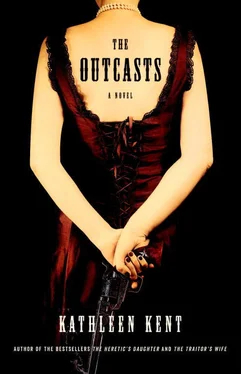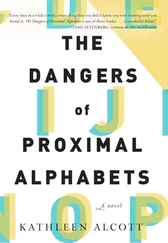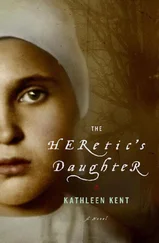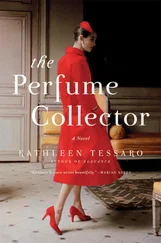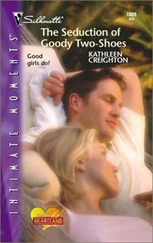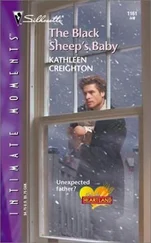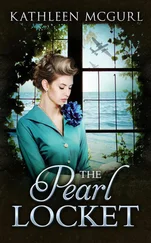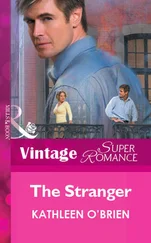She then opened the first few copybooks and scanned the sometimes precise, sometimes uneven essays completed in class, mostly to do with the legends of the local islands. “The Legend of Wild Man Island,” “The Tale of Red Horse Island,” “The Story of Broken Neck Island”—as though the flowing stream of notable history had been trapped and congealed on those small bodies of land surrounded entirely by the brackish waters of outlying bayous.
She picked through the books until she found May’s essay and she began reading. Halfway through the second page, Lucinda smiled and whispered, “Good girl.”
The rain was dissipating, blowing southward, and Lucinda looked through the murky glass that made up the ceiling. Enough blue to patch a Dutchman’s pants, she remembered her father saying, his description of a clearing sky.
As she looked, she became aware that she could see the outline of a man in one of the small panes of glass. Or rather, the pane contained the reverse image of a human silhouette, hazily white against a darkened background.
She let her eyes focus on an adjacent section of glass and realized it, too, had the faint but unmistakable figure of a man. She stood up, the hairs on her arms rising, and strained to see the images more closely, finally coming to understand that every pane was a photographic negative of a soldier in uniform. When she visited the shed earlier, the cloud cover had kept her from perceiving the original purpose of the glass; she had thought the darkened areas of the ceiling to be the grime of years.
She stepped onto a crate to examine the negatives more closely. The boxed-in panes of glass showed men of all ages, and more than a few boys, each posing in front of the same static background, some sporting pistols, others holding rifles, all hinting at the prideful, boastful sentiments in those moments before they had ventured into armed conflict. If the resulting photographs had been printed and framed, elaborately or simply, draped with medals of sacrifice or bands of black crepe, they would have held a kind of paradox: the appearance of life but inexorably a proof of what had departed, never to return.
The sun had begun to bleed out the images of the soldiers. It had been five years since the end of the war, and some of the portraits would have been made at the start of the conflict, in ’61. Soon the plates would be scoured clean, and it would be a kind of second death. She would never again believe the glass was merely dirty. She would always see the men floating above her head.
Lucinda stepped off the crate, imagining ghosts and the legends of ghosts. She would have the chance the following evening to question May about the topic of her essay: the story of pirate’s gold—chests full of it—buried within a few miles of the settlement.
She picked up the scattered books and stepped out of the greenhouse. She smelled the tang of tobacco filling the air and, curious, followed the scent. On the ground, still smoking, was the discarded butt end of a crudely rolled cigarette. A motion caught her eye, and she saw a black man walking quickly across the fields. She watched him for a while before he turned briefly to look back, but he soon disappeared into a stand of trees close to the water. She stamped out the glowing end of the cigarette with the ball of her foot and continued on her way to the house.
The men spent three days in Austin. One day for church, and two to allow Dr. Tom time to recover from a damp lung the cold rain had inflicted. They slept in barracks shared by a few federal soldiers and local policemen. Nate was left on his own for a good deal of the time—Deerling restlessly joining the local police on surveillance rides to the south—and, after making his official report, Nate walked up and down the streets, in and around the main thoroughfares, looking at the saloons, dry-goods stores, and hotels filled with men and women finely dressed. They had a boldness about them that the small-town settlers lacked. Congress Street, the main road that was plotted from the river all the way to the capital building, had, Dr. Tom said, grown so rapidly in the past few years that he hardly recognized it.
The morning of the third day, Nate waited at the door of the post office for a half an hour before it opened at eight o’clock. He was disappointed not to find any mail from his wife, but he convinced himself that he had outpaced the mail wagon from Oklahoma. He posted one long letter to her describing all he had seen in Austin, Dr. Tom’s illness, and the incident with the snake, knowing she would be pleased with what he had learned from her. He also added instructions for her to send all future letters to Houston.
In closing, he wrote,
The city is filled with building works and wonders of comfort for man and beast. Yesterday, in a dry-goods store, I saw a device with serrated teeth, which, when cranked, will cut off the top of a tin can in a moment flat. But the city is not at peace with itself. The governor is roundly hated. Everyone is bristling with firearms, ready at a moment’s notice to begin shooting at any imagined threat or cross word, and though Governor Davis has given me a policeman’s job, I will be happy to be on my way to Houston. My love always to you and Mattie.
Inside the letter he placed a braided horsehair necklace strung with a few colored beads for his daughter. He had bought it from a dignified black woman, her cart of beaded wares set up at the first light of morning. The sign on the cart read For the Wheatville Girls School. She accepted his quarter with long, graceful fingers, smiling broadly when he tipped his hat to her.
He walked to Scholz Garden on San Jacinto Street and paid for a beer, the first beer he had ever drunk alone. He eyed the hard-boiled eggs floating in clouded water in a large glass jar and declined the bartender’s offer of them, even though they were free to drinkers. He picked up an old discarded newspaper left on the bar and read about events that had happened a full year ago: “John Wesley Hardin Kills Three Soldiers,” “Treaty of Medicine Lodge Violated by Comanche,” and one article about a knife fight in an Abilene saloon headlined “You Are a D—d Liar, Sah!”
The saloon was dark and quiet, and he reflected on his uncertain position with Deerling. After the incident with the snake, the ranger had continued to ignore him, but true to his word, after they had drawn their month’s pay, he left the barracks abruptly and returned an hour later with an early-model Winchester rifle. He handed it to Nate, saying only “Pay me when you can.”
Nate heard a whooping noise from outside the beer hall, followed by the clattering sounds of a group of riders approaching. He walked with the bartender and the few other patrons to the shaded porch and watched the thirty or so men approaching on horseback.
The riders wore long robes, bed linens or lengths of sewn muslin, all of it white; their faces were covered with hoods, holes cut out for their eyes. A few had conical caps shaped like inverted funnels on their heads, and Nate turned, openmouthed, to look questioningly at the bartender by his side.
The bartender spat a long stream of tobacco juice into the dirt. “The Klan has made it all the way from Tennessee. There won’t be a nigger safe from here to Uvalde County.” He turned and walked back inside, and Nate watched the riders being cheered down the length of San Jacinto.
Returning to the barracks, he did not see the black woman with the cart.
He entered the bunk room quietly but saw that Dr. Tom was sitting up reading with a flannel wrapped around his throat. Nate told him what he had seen on San Jacinto.
Dr. Tom shook his head. “Grown men wearing bedsheets.” He put his book aside and looked closely at Nate, who was sitting on a chair, frowning, chewing at his bottom lip.
Читать дальше
